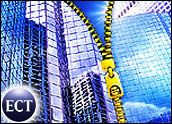
Oracle and Sun Microsystems have announced, amid much fanfare and mutual gushing, that they are still committed to their partnership.
“It was basically a renewal of their vows,” Charles King, principal analyst with Pund-IT Research told TechNewsWord, “with a few interesting wrinkles.”
For instance, Oracle announced it will license Sun’s Java programming language for another 10 years. For its part, Sun will offer Oracle’s enterprise database for free on its mid-range and high-end servers running UltraSparc processors.
Corporate Makeovers
In general, Oracle and Sun have been traditional allies against IBM. Lately, though, both companies have been undergoing transitions that have resulted in the need to retool their partnership into a more strategic undertaking. Sun is still absorbing the new initiatives the company introduced over the last year, while Oracle is moving to remake itself as a provider of enterprise software.
IBM has become a growing threat to both, despite its partnership with Oracle in some areas.
Sun has been struggling in the data center against Linux, IBM and, to a certain extent, Microsoft. Over the past year, Sun has open sourced its major operating system, Solaris; it has introduced a new chip that uses eight cores and runs on low energy, the Ultra Sparc TI processor; and it has moved more deeply into grid computing. Receiving an endorsement from Oracle during this time is a major boost for the company.
Oracle, for its part, has been in acquisition mode — first absorbing PeopleSoft and, more recently, moving to add Siebel.
Sun Benefits
By bundling Oracle’s database on its higher-end servers, Sun is trying to stem its losses in this space, which have been mainly to IBM’s DB2. “Sun does better in the lower end,” King said. Some of those losses have been due to costs, but IBM’s superior performance has been another factor.
“IBM has set benchmark after benchmark, and Sun has had trouble keeping up,” King said. “They needed to find a way to keep their existing customers. The way to do that is either increase your bells and whistles or cut costs. Sun opted to add the bells and whistles.”
Oracle database products are also getting significant pressure on the high end from IBM, King continued, and from Microsoft on the lower end, although to a lesser extent. “The database is becoming a commodity,” King said. “It is clear Oracle realizes that and is trying to retool itself as a business line vendor like SAP.”
By aligning with a still fairly vibrant Unix player, Oracle is betting it will maintain its foothold among those customers, he said.










































